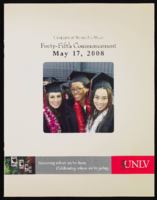Search the Special Collections and Archives Portal
Search Results
Greg Clemens Photograph Collection
Identifier
Abstract
The Greg Clemens Photograph Collection contains ten black-and-white contact sheets depicting aerial views of Las Vegas, Nevada in 1965. The contact sheets contain approximately eighty-two images showing views of McCarran International Airport, the Las Vegas Convention Center, downtown Las Vegas, and residential neighborhoods.
Archival Collection
Howard Schwartz Collection on Gaming
Identifier
Abstract
The Howard Schwartz Collection on Gaming documents the gaming industry in the United States from 1966 to 2010. The collection includes manuscripts, periodicals, newspaper articles, ephemera, profit and probability profiles and a report from the National Gambling Impact Study Commission.
Archival Collection
Paul May Papers
Identifier
Abstract
The Paul May Papers (1963-1984) contain correspondence, reports and minutes from the Nevada Legislature, campaign materials, and invitations to various events.
Archival Collection
Soroptimist International of Henderson/Green Valley Chapter Records
Identifier
Abstract
Soroptimist International Henderson/Green Valley Chapter Records from 1980 to 2004 include meeting minutes, programs, photographs, conference materials, promotional material for various fund raisers, awards, and a gavel.
Archival Collection
Freda Klein Papers
Identifier
Abstract
The Freda Klein Papers (1967-1997) include a detailed biography and personal reflection penned by Klein, as well as a photocopied scrapbook. The scrapbook is comprised of correspondence and newspaper clippings that detail her career with the State of Nevada Employment Security Department and volunteer work with the Henderson Chamber of Commerce, Private Industry Council, and Soroptimist International of Henderson, Nevada.
Archival Collection
Guide to the Canadian Film Centre Worldwide Short Film Festival Submissions
Identifier
Abstract
The Canadian Film Centre Worldwide Short Film Festival Submissions Collection is comprised of films submitted to the Canadian Film Centre Worldwide Short Film Festival during the festival years 2002 to 2006. The collection is comprised exclusively of audiovisual materials (VHS and DVD formats).
Archival Collection

University of Nevada, Las Vegas (UNLV) 45th commencement program
Date
Archival Collection
Description
Commencement program from University of Nevada, Las Vegas Commencement Programs and Graduation Lists (UA-00115).
Text

Transcript of interview with Gene Greenberg by Barbara Tabach, February 12, 2015
Date
Archival Collection
Description
In 1976, Gene Greenberg decided to accept a job transfer with Donrey Media Group and relocated from Laredo, Texas to Las Vegas. Las Vegas was comfortable fit and for the next 30 years, he primarily worked in television ad sales. He rose to become executive vice president and general manager of KVBC-TV. Significant to Gene’s ties to Las Vegas have been his ties to the Jewish community. This oral history includes reminiscences of connecting with the Jewish community and meeting many of the Jewish leaders through Young Leadership, Jewish Federation, and being on the board for Temple Beth Sholom. The most poignant aspect to his Jewish roots is the survival of both his parents during Holocaust. Both Helen and Abe Greenberg were from Lodz, Poland and interred in concentration camps. Gene is a frequent presenter of their story for his commitment to Holocaust education and as a member of the next generation. Gene and his wife Melanie both spent their childhoods in Kansas City, Missouri and are graduates of the University of Missouri-Kansas City. They married in 1970 and have three children: Sari Mann, Elissa Burda, and Jaron Greenberg.
Text

Transcript of interview with Morris "Moe" Dalitz by Brenda Baxter, November 4, 1977-March 30, 1978
Date
Description
Interview with Morris "Moe" Dalitz by Brenda Baxter, on several dates in late 1977 to early 1978. In this interview, Dalitz talks about his business and career endeavors before coming to Las Vegas, which included a laundry service and military service. Dalitz partnered with Wilbur Clark and became a successful hotel and casino owner in Las Vegas, as well as a real estate developer with properties including the Boulevard Mall and Sunrise Hospital.
Moe Dalitz was born in Boston in 1899, and soon after his family moved to Detroit, Michigan and where his father started a linen supply company. In 1930, during Prohibition, Moe moved to Cleveland, Ohio and he became involved with the then-illegal liquor business. At the age of 41, Dalitz enlisted in the Army and was stationed at Governors Island. Moe was put in charge of laundries and dry cleaning because of his experience in the laundry business. He played an important role in creating mobile laundry units that were used in the front lines in North Africa. His ingenuity won him a non-combatant award for his "unusual interest, ingenuity and talents" applied during his service. At the end of war, Moe returned to Cleveland, where his partners were successfully carrying on their business. It was then that they decided to go into the casino-nightclub business, opening nightclubs in Ohio and Kentucky. A couple years later, Moe and his partners met Wilbur Clark and agreed to finance his inactive project in Las Vegas. Thus, in 1950, the Desert Inn Hotel and Casino opened, and Moe Dalitz ushered in a new era for the city. Moe and partners continued to elevate the sophistication of the Strip when they acquired the operating lease to, and later part ownership of, the Stardust Hotel and Casino. Moe was instrumental in bringing the French Lido de Paris show to the Stardust, which was considered the most spectacular nightclub show produced in Las Vegas at its time. In addition to his gaming industry ventures, Moe engaged in significant real estate development, along with partners Allard Roen, Merv Adelson and Irwin Molasky. Their projects included Sunrise Hospital, The Boulevard Mall and Las Vegas Country Club as well as La Costa Resort and Spa in California. At the time of the interview, Moe was involved with the construction of a downtown hotel and casino. Moe Dalitz was the recipient of the Humanitarian Award from the American Cancer Research Center, and supported the Variety Club and the Home of the Good Shepard, amongst other charities.
Text

William McCullough interview, February 26, 1979: transcript
Date
Archival Collection
Description
On February 26, 1979, collector Pete Wahlquist interviewed William McCullough (born May 9th, 1905 in Kansas City, Missouri) at his home in Boulder City, Nevada. In this interview, Mr. McCullough discusses moving to Nevada and working on the building of Hoover Dam (Boulder Dam). He also speaks about Boulder City during the time of building the dam, as well as the growth he has seen happen in Las Vegas, Nevada.
Text
